Accelerating high-tech training

Dr Moumita Aich to be head of WAADD
Dr Moumita Aich is set to assume the new role of Head of the Wits Anglo American Digital Dome (WAADD) as of 01 July 2024.

Wits Dean of Sciences Leads Incorporation of Ukraine into International Physics Union
Dean also supports two Wits academics and Ukrainian nationals in attempts to get their family to safety.

Barberton Geotrail Education Tour
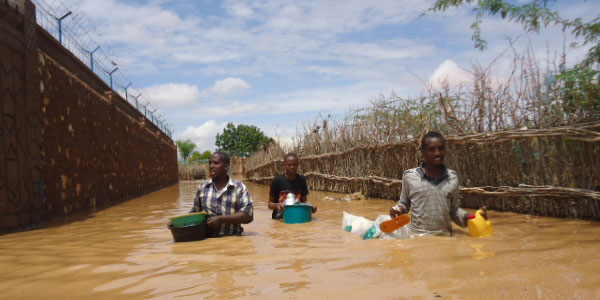
Southern Africa must brace itself for more tropical cyclones in future
In the last 30 years, there’s been a progressive rise in the number of high category tropical storms.

Shedding a new light on optical trapping and tweezing
Wits physicists demonstrate a new device for manipulating and moving tiny objects with light.

Detective mission to characterise and trace the history of a new African meteorite
Wits researchers go on a mission to describe, classify and trace the 4.5 billion-year-old history of a meteorite that landed in Madagascar.

10 years of SA-CERN
Collaboration on Fundamental Physics celebrates a decade, of among others, Wits’ involvement in accelerated technology development.

Experts find stone tools connected communities
Stone tools from the Middle Stone Age in South Africa shows that different communities were connected over long time periods over vast geographical areas.

Wits and Perot Museum launch virtual reality app of Dinaledi cave
Free virtual reality experience provides global access to the Dinaledi caves to researchers, students and amateur explorers.
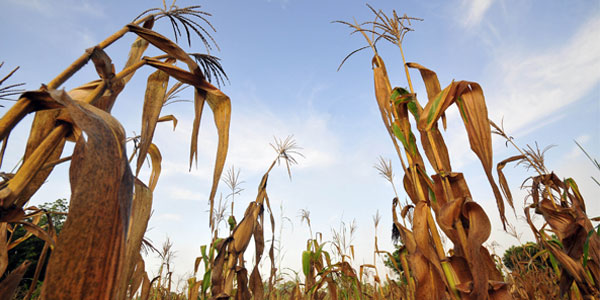
What southern Africa needs to do to manage rising temperatures
The climate situation is already worse in southern Africa than in most other regions, the region having crossed the 1.5°C warming level some years ago.

Wits Professor Lee Berger wins Science for Society Gold Medal
The Academy for Science SA (ASSAf) awarded Berger its Gold Medal for excellence in the application of outstanding scientific thinking in service to society.

Climate change: We should react with speed, focus and urgency
GCI Director Barend Erasmus gives insight into the latest alarming IPCC Special Report on Global Warming.

Does sunny South Africa really have an ideal climate for tourism?
This is how TripAdvisor reviews provide insight into tourists’ experiences of weather, from which adaptation plans can be successfully implemented.

Wits partner on physics education conference
Wits University is the co-host of the International Conference on Physics Education, which is being held at the Misty Hills Hotel this week.
The passing of Professor Sergio Colafrancesco
It is with great sadness that the University announces the passing of Professor Sergio Colafrancesco, a scientist and member of the School of Physics.

Ledumahadi mafube – South Africa’s new Jurassic Giant
A team of international scientists, led by Professor Jonah Choiniere from Wits, described a new species of a giant dinosaur that has been found near Clarens.
Awards for Wits researchers advancing science for society
The National Research Foundation has recognised Wits researchers for advancing their fields.

First South African fossil hunters
Public Lecture series to celebrate Heritage Day will focus on the earliest fossil hunters in Southern Africa and their findings.
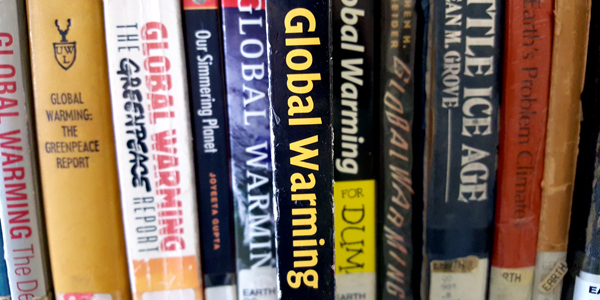
Climate change, water and the spread of diseases
Connecting the dots differently to grasp the impact of climate change on people, and specifically, on public health.
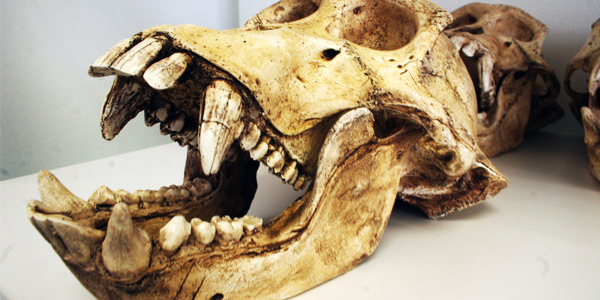
What it would mean to decolonise palaeontology
The call by students to “decolonise science” still rings in many South African academics’ ears.

Wits scientists closer to slowing progression of Alzheimer’s
A breakthrough by Wits scientists could see patients with Alzheimer’s use a nasal spray to slow down the progression of the disease, the main cause of dementia.

Two new Chinese dinosaurs discovered
New fossils from north China shed light on the incremental evolution of insect-eating dinosaurs.

Wits signs Memorandum of Understanding with Perot Museum
The MOU is part of the Museum’s new focus on human origins, plans to increase research, produce traveling exhibitions, and cultivate scientific communications.

Wits maths fundi equates to global maths advocate
Former Wits Vice-Chancellor and Principal, Professor Loyiso Nongxa has been elected as a Vice-President of the International Mathematical Union (IMU).

We are all connected
Wits scientists share humanity’s common heritage with Heads of State during 10th BRICS Summit.

Mandela and the treasure in the Blombos Cave
Many Norwegian researchers had a close relationship with Nelson Mandela but few as close as Christopher Henshilwood, also of Wits ESI, did.

Largest symposium in almost 50 years
School of Geosciences congratulated on “one of the best” International Platinum Symposiums ever.

Fragment of impacting asteroid recovered in Botswana
Researchers from the Wits School of Geosciences were involved in locating the fall area of the meteorite in Botswana’s Central Kalahari Game Reserve.

Wits researchers on the red carpet at "Science Oscars”
Wits academics Prof. Ian Jandrell, Dr Musa Manzi and Prof. Stephen Tollman have won prestigious NSTF-South32 Awards, the “Science Oscars” of research.

Cranium of a four-million-year-old hominin shows similarities to ours
The “virtual” revisiting of a fossil described as “the oldest evidence of human evolution in South Africa” shows surprising results, compared to modern humans.

In the gaping mouth of ancient crocodiles
As a modern apex preditor, the crocodile's mode of attack - its mouth - had humble beginnings

Gauteng maths giant set to rise from its slumber
Gauteng schools are gearing to reclaim their reputation as maths whizkids.

Scientists peep deep into a diamond to examine its defects
Researchers take a deep look into a diamond to see how the atoms in its platelet defects are arranged in the hardest natural material known to man.

Computational models show that planets can easily exist in triple star systems
Researchers map out regions where exoplanets can exist within triple star systems.

First tetrapods of Africa lived within the Devonian Antarctic Circle
Fossils of two new species of these four-legged vertebrates also evolved in polar regions, and not just in the tropics as previously believed.

Bridging the digital divide with photonics
Wits physicists and engineers team up to tackle Africa’s digital divide with home grown technologies

Wits students at CERN meet with Science Minister and UN ambassador
Students rub shoulders with Minister of Science and Technology and the Head of the Mission of South Africa to the United Nations in Geneva.

Clean sweep for Wits at international data science competition
Four Witsies learn about cloud computing, then go on and beat the global competition in the field.

Making massive leaps in electronics at nano-scale
Wits PhD student finds a way to control the spin transport in networks of the smallest conductor known to man.
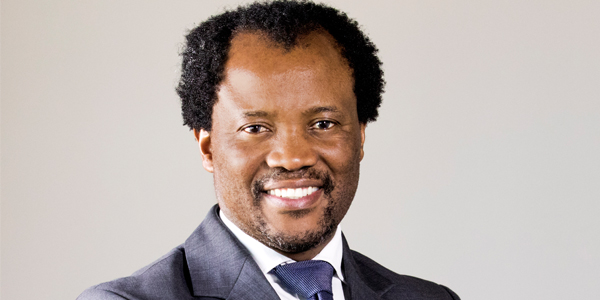
The vehicle of nature
Editorial: Future world wars will be fought over water – a resource that is scarce in many parts of the world, including sub-Saharan Africa.
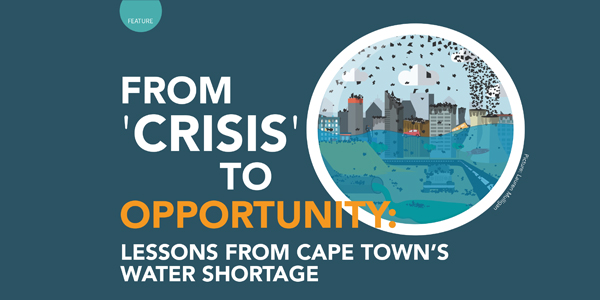
From 'crisis' to opportunity
Lessons from Cape Town’s water shortage.

The heat of acid mine drainage
Mining is a key contributor to South Africa’s economic development but its effect on the environment could spell disaster.

Hunting aliens from space
Wits researchers are using high-tech imagery and biological agents to save our water resources and economy from invasive alien plants.

WASH - a pipeline to saving lives
Diarrhoea is one of the leading causes of sickness and death in children under five in South Africa.
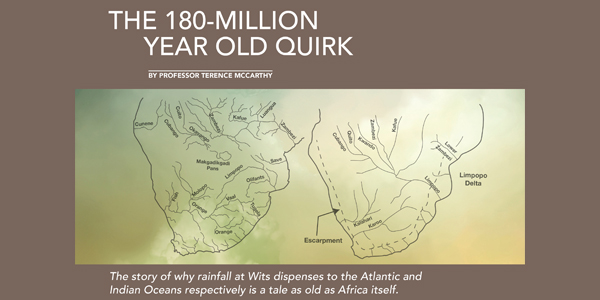
The 180-million year old quirk
The story of why rainfall at Wits dispenses to the Atlantic and Indian Oceans respectively is a tale as old as Africa itself.
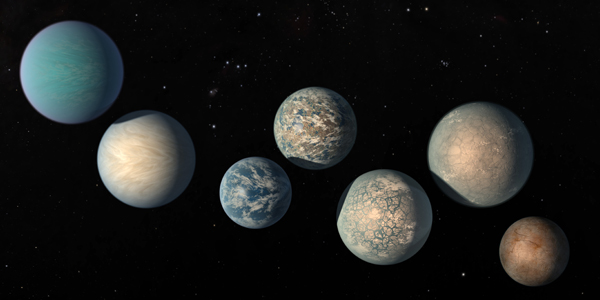
Our pale blue dot
Q&A with Professor David Block from the Wits School of Computer Science and Applied Mathematics.

Building the world’s most powerful microscope using particle accelerators
Bruce Mellado, National Contact Physicist of South Africa at the ATLAS experiment at CERN, says there are future plans for a bigger, better LHC.

National Geographic seek to fund Wits student projects
Society seeks to increase its funding to South African students doing research in the country.

Where hominid brains are concerned, size doesn’t matter
The human-like features of Homo naledi's brain surprised the research team that examined the fossil's brain imprints.

It is now up to us
Humans are facing a #Watershed moment in our efforts to secure a collective future.

Fossil teeth reveal new facts about a mass extinction
Around 260 million years, the earth was dominated by mammal like reptiles called therapsids.

Wits celebrates its rated researchers
The Wits Research Office has recognised scholars at the University whom the National Research Foundation (NRF) has rated or re-rated.

Ancient DNA changes everything we know about the evolution of elephants
For a long time, zoologists assumed that there were only two species of elephant: one Asian and one African.

Tech giant recognises African machine learning research
Wits robotics researcher awarded Africa’s only grant in the 2017 round of the Google Faculty Research Awards.

Recreating our ancestral past
Wits – in the champion’s league of archaeology – hosted the first African Conference on Experimental Archaeology.

How we recreated a lost African city with laser technology
LiDAR, was used to “redraw” the remains of the city, along the lower western slopes of the Suikerbosrand hills near Johannesburg.

When great minds meet
Professor David Block accompanied Stephen Hawking to meet former President Nelson Mandela in Johannesburg.

The profound impact of Stephen Hawking
He remains a luminary for those of us who study gravity for a living for his deep physical insights.

New insights into how southern African pythons look after their babies
Snakes are probably not the first creatures that spring to mind when you think about caring parents.
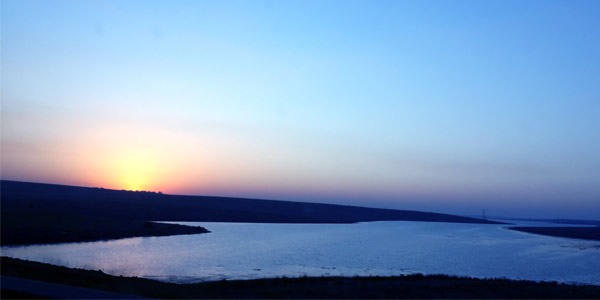
Why UNESCO’s ‘natural solutions’ to water problems won’t work in Africa
Each year UNESCO releases a World Water Assessment Report, a document that explores potential solutions to the globe’s water problems.

Cold-blooded pythons make for caring mums
Female South African pythons are the first ever egg-laying snake shown to care for their babies - at great cost to themselves.

Accelerating high-tech training
Wits students contribute to the upgrade of the high-tech software and hardware at the CERN ATLAS detector.

Scifest Africa 2018
Catch these Wits researchers at South Africa’s National Science Festival that kicks off in Grahamstown today.

New study reveals the secret of magmas that produce South Africa's national treasures
Study conducted by the School of Geosciences reveals how platinum-bearing chromite layers form in the crust of the Earth.

Water wise learners
Gauteng grade 11 learners tackle SA’s water crises.

FameLab, “Pop Idols of Science” back at Wits
Wits University will once again be hosting the international Famelab science competition in March.

Africa’s rich fossil finds should get the air time they deserve
Palaeontology, like much else in the cultural landscape, has a strong western influence and bias.

Why are there so few black women in science?
Ndoni Mcunu, PhD-candidate at the Global Change Institute at Wits University and founder of Black Women in Science (BWIS), shares her personal journey.

Wits researchers are World Academy Scientists
Professors Bob Scholes and Shabir Madhi have been elected as Fellows of the prestigious The World Academy of Sciences (TWAS).

Sustainable impact from a founding father of green chemistry
A Distinguished Professor of Biocatalysis at Wits, Roger Sheldon has published a paper on green chemistry in a prestigious high-impact research journal.

Keeping famine weed at bay
A leaf-feeding beetle is one of the most promising agents that help South Africa to control the spread of its worst invader plant.

Solving the puzzle of multicellularity
Wits PhD student pieces together the mystery of how single cell life forms evolved into multicellular organisms.

Yum yum! Tasty termites
Rich in proteins, fats, vitamins and nutrients - PhD-student unearths the benefits of edible termites in new study.

Print a 200-million-year-old dinosaur fossil in your own home
CT-scan study of Wits PHD student makes it possible to 3D print the skull of the dinosaur species Massospondylus that roamed South Africa 200 million years ago.

Lee Berger named SA’s ‘most visible’ scientist
Wits palaeoanthropologist tops 25 300 others in a new study on highly visible scientists.

Wits’ optics research among best in 2017
Research into optics and photonics by Wits physicists has been highlighted as some of the most influential in 2017.

Little Foot takes a bow
After 20 years of painstaking excavation and preparation, Professor Ron Clarke introduces the most complete Australopithecus fossil ever found to the world.

Wits Dean of Science a Royal Society Fellow
The Dean of the Faculty of Science at Wits University has been elected as a Fellow of the Royal Society of South Africa.

Wits University scientists highly cited worldwide
Two scientists from Wits University are on the list of Highly Cited Researchers in the world.
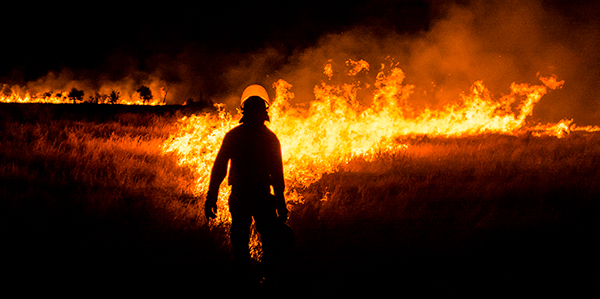
Thinking big by burning small
Creative management of grazing through the use small fires can draw back herbivores to grazing areas that are avoided by animals.

New Centre of Centre of Excellence to focus on early human behaviour
Collaboration between Wits and the new CoE at University of Bergen is essential to answer some of the most fundamental questions about our ancestry.

How African elephants’ amazing sense of smell could save lives
For 27 years Angola was gripped by civil war. Half a million human lives were lost and wildlife, too, was decimated to sustain troops.

Lost mountains in the Karoo reveal the secrets of massive extinction event
Fossil records near the lost Gondwanides mountains show that the Permian-Triassic extinction started 1 million years prior to what was previously believed.

Wits team involved in international breakthrough in astronomical observation
Breakthrough paves the way for future Multi-Messenger astronomical observations

Systems Analysis: Seeing the bigger picture
In September, the Wits Rural Facility became a ‘lab in the bush’ for a hands-on systems analysis thinking and modelling programme.

Early 'homebodies'
New study finds 'staying longer at home' was key to Stone Age technology change some 60 000 years ago.
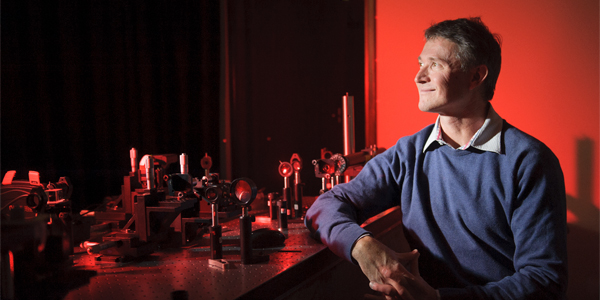
Light to break bandwidth ceiling
The rise of big data and advances in information technology has serious implications for our ability to deliver sufficient bandwidth to meet the growing demand.

Wits researchers excel at National Research Foundation Awards
Nine researchers from Wits University were recognised by the National Research Foundation (NRF) at the 2017 NRF Research Awards in Bloemfontein last night.

Dr Tiisetso Lephoto
Dr Tiisetso Lephoto from the School of Molecular and Cell Biology is an avid science communicator.

Professor Lynette Wadley
One of Africa’s leading archaeologists, Professor Lynnette Wadley first worked as a teacher in Zimbabwe and South Africa.

Professor Yevhen Zelenyuk
Professor Yevhen Zelenyuk from the School of Mathematics at Wits obtained his masters and PhD degrees from Kiev Shevchenko University in the Ukraine.

Using high tech to tell the story of ancient man
Origin Centre's new Virtual Reality experience uses state of the art communications technology to tell the story of what makes us human.

A leader among leaders in archaeology
The National Research Foundation (NRF) has awarded an A1-rating to Professor Lyn Wadley.

Habitat destruction and poaching is threatening the Sungazer
Novel genetic techniques might be used to understand the effects of habitat transformation as well as to combat illegal trade of the animals.

Aardvarks’ tragic fate points to worrying consequences for wildlife as a result of climate change
The aardvark will become increasingly rare as the world warms and dries, and the consequences go well beyond a decline in aardvark safari encounters.

'Invasive' species have been around much longer than believed
Pollen record of plant, that is currently being eradicated, extends much further back than the 100 years it is believed to be growing in the Lesotho Highlands.

Rockefeller writing residency for Rising from the Rubbish
Dr Melanie Samson has been awarded one of the most sought after writing fellowships to work on her book, "Rising from the Rubbish".

Mathematics - A gateway to many career paths
网易体育 70 percent of career paths need mathematics, says Professor Loyiso Nongxa.

